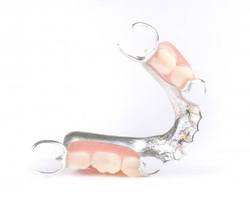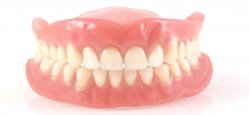Dentures – Greenfield, MA
Missing Multiple Teeth? Dentures Restore Your Smile!

If you’re missing multiple teeth, just know that you are not alone. Forty million Americans are estimated to be missing all of their teeth, and about 178 million Americans are estimated to be missing at least one tooth. Since tooth loss only increases the risk of future tooth loss, now is the time to start thinking about replacing those teeth and preventing the inevitable effects that come with it.
When you visit BGH Dental, the dentists can create a denture that fits your mouth precisely and comfortably. Thanks to their versatility, it’s easy to replace several teeth or an entire arch! By contacting our office today, you can get started restoring your smile and making your daily life easier and more enjoyable.
Why Choose BGH Dental For Dentures?
Who’s a Good Candidate for Dentures?

If you’re missing all of your teeth and don’t intend on getting dental implants any time soon, then traditional dentures are likely the most appropriate option. This restorative solution can effectively replace several consecutive missing teeth, multiple missing teeth throughout your mouth, or every single tooth in an arch! No matter what your dental needs are, we recommend speaking with one of our dentists. They’ll review your dental history, learn more about your smile goals, and solidify all of the details of your treatment.
Effects of Missing Teeth

Knowing what to expect from the consequences of tooth loss can help you understand the importance of replacing missing teeth. Firstly, the most common causes of this situation involve decay, gingivitis, accidental physical injury, and even poor oral hygiene habits. There can also be particular systemic conditions that can make you susceptible to losing your pearly whites.
Now that you know how tooth loss can happen, you’ll need to know why it’s essential that you replace them. Leaving missing teeth unaddressed can lead to complications such as your remaining pearly whites shifting out of position to fill the gaps, a receding gumline, and jawbone deterioration. Additionally, you’re likely to face certain everyday problems, like trouble speaking, difficulty eating, and reduced self-confidence.
What Qualifies You for Dentures?

Generally speaking, people who are missing one, some, or all of their teeth can be candidates for dentures in Greenfield. These prosthetics are incredibly versatile and can be custom-designed to fit specific smiles, especially those that are suffering from tooth loss, sensitive teeth, or even decay. The main thing is that you should have healthy gums, sufficient jawbone density, and be committed to maintaining good oral hygiene.
Since dentures come in different types, we’ll need to consider factors like the number of teeth that you’re missing. Depending on your situation, you may be able to choose from a few variations, such as partial dentures, full dentures, or implant dentures. This treatment is also incredibly cost-effective, meaning you won’t have to break the bank to renew your smile.
Alternative Tooth-Replacement Options

Even if you aren’t a candidate for dentures, it doesn’t mean you’ll be completely out of options. Some of our other tooth-replacement treatments include:
- Dental Bridges: If you’re missing one or several teeth in a row, we can use a dental bridge to replace them. This procedure requires that your adjacent teeth are healthy so that they can support the dental crowns and pontics.
- Dental Implants: For a more stable and natural-feeling solution, you might consider getting dental implants. Instead of relying on healthy teeth or gums, we can embed titanium posts into your jawbone to directly anchor your restorations to your facial structure. This does require sufficient bone density, but the results can last a lifetime with proper care.
Types of Dentures

To start, there are three types of traditional dentures to consider. These include partial dentures, full (complete) dentures, and implant dentures. You can learn more about each right here:
Partial Dentures
Partial dentures are designed to replace several teeth at a time, typically on both sides of a specific arch. They are ideal for those who need to replace more teeth than what a traditional bridge can replace, but still have remaining teeth that the partial can properly hook onto. The denture itself is typically made with a metal base, but the visible portions like the teeth are made entirely from porcelain. The area around the crowns may also be pink in order to better blend in with existing gum tissue.0
Full Dentures
Full or complete dentures are designed to replace either one or both arches at a time. Full dentures are typically created with more cosmetic detail in mind and fabricated entirely out of acrylic and porcelain. The acrylic portion makes up the gum tissue while the porcelain makes up all the individual teeth.
Unlike partial dentures, full dentures are meant to be held in place via the natural suction of the gums. As you adjust to the denture, you may also use denture adhesive. This material helps your mouth get used to wearing it over time, but should not be considered a permanent solution.
Implant Dentures
As the name suggests, implant dentures are where traditional dentures and state-of-the-art dental implants meet. Although there are some similarities between traditional and implant dentures, one significant difference is how your new teeth are secured in place. With implant-retained restorations, we surgically insert them directly into the jawbone, which provides a new level of stability.
Benefits of Dentures

When you are missing several teeth, it can be difficult to complete daily tasks, like eating, speaking clearly, and smiling without feeling embarrassed. Dentures are a life-changing tooth replacement option because of their ability to improve quality of life through their numerous benefits. If you have suffered from tooth loss, here are some of the things you can experience.
Psychological Benefits

People who don’t have any teeth often have difficulty accepting tooth loss. This can have negative effects on social life as well as increased risks of sadness and depression. By restoring the appearance and function of one’s smile with dentures, patients are likely to experience an increase in their confidence and self-esteem. Dentures can also reduce anxieties related to appearance, speech articulation, chewing ability, and more!
Clearer Enunciation

Missing teeth can make it more difficult to speak. To pronounce and perform certain words, your lips and tongue need to be positioned in a certain way. When you aren’t able to touch your tongue to your teeth, some words are very difficult to say clearly. Because dentures act as your missing teeth, they allow you to enunciate more clearly while speaking. After a short adjustment period and a little bit of practice, speaking will come naturally.
Improves Nutrition

Many foods that are good for you are tough in texture, like certain vegetables, fruits, and healthy proteins. When you are unable to chew your food thanks to tooth loss, you can experience issues like indigestion and malnutrition. With an improved ability to chew, dentures allow for a more expansive diet filled with nutritious foods. This way, you can get the essential nutrients your body needs to thrive.
Preserves Oral Health

If you still have some healthy remaining teeth in your mouth, getting dentures can help prevent them from shifting to other areas of your mouth. Dentures also help to bear some of the weight of regular chewing, therefore reducing the wear and tear of your existing teeth. Ultimately, they can help to preserve the health of the rest of your smile.
Expands Opportunity

Your smile is one of the first things that people notice about you when they meet you. When it comes to job interviews, sales, and getting promotions, it’s crucial that you make a great first impression. Having a complete smile is certainly an advantage when it comes to your success.
Dentures FAQs
Can I Sleep With My Dentures in My Mouth?
Thanks to high-quality materials and advanced technologies, your dentures will fit so well that you may never want to take them out. Not to mention, no one wants to be caught without their teeth. However, your dentist will instruct you to wear your new dentures in Greenfield for 24 hours after getting them, but after that time, you must remove them at night. Your new set of teeth will restrict gum circulation to your gums. Your soft tissues will need a break to receive nutrients to stay healthy. You can be at risk of sores, infections, and inflammation if you sleep with your dentures. Oral bacteria can also accumulate on them overnight, which can affect your oral health and your general wellness. Over time, it can damage your denture, causing you to need a replacement sooner. It's best to clean your dentures and place them in an overnight soaking solution before heading to bed. You'll keep your mouth and body healthy while also getting the most from your investment.
Do Upper Dentures Always Cover the Palate?
It's not unusual to have concerns about an upper denture irritating the roof of the mouth or causing diminished taste. If they occur, they are only temporary issues. However, you may still prefer a palate-less option. Your denture dentist in Greenfield will help you choose the best denture for your preferences and needs. There are many palate-less prosthetics, like those with a horseshoe shape, similar to a lower arch denture.
Can I Eat Steak With Dentures?
It's entirely possible to eat steak with dentures, but it's not always a good idea. Steak is tough and requires a lot of chewing, which puts wear and tear on your dentures. It can also lead to sore gums and jaw pain. It's best to have steak in moderation and tenderize it before cooking. Cut it into small pieces to make it easier to chew. You may also find a denture adhesive helpful to give you more stability, so you don't have to worry about your dentures falling out at the table.
Do I Use Regular Toothpaste to Clean My Dentures?
Regular toothpaste is abrasive, which can scratch your dentures and make them look discolored. Food residue and plaque can also get trapped in the scratches, damaging your dentures and causing unpleasant odors. It's best to use a soft-bristled toothbrush and a mild hand soap or dishwashing liquid. You can also purchase cleaning products designed for dentures. Besides brushing your dentures, use an overnight soaking solution to kill any bacteria that may be hiding in hard-to-reach areas.


